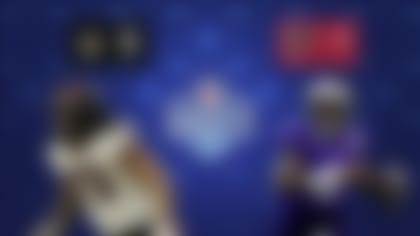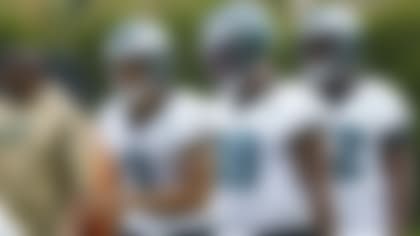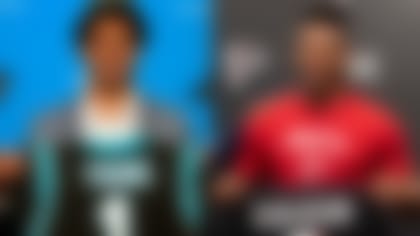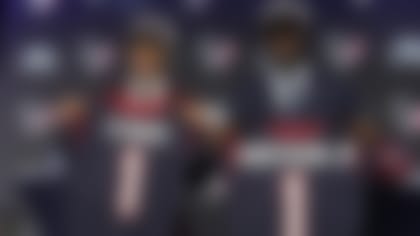Why provide instant grades on the selections of prospects who have yet to take an NFL snap? Well, you're reading this, aren't you? Considering the makeup of every roster and the factors surrounding each pick, Gennaro Filice and Dan Parr attempt a division-by-division assessment of the 2020 NFL Draft. Keep in mind that these grades are based on draft hauls alone -- picks traded for veteran players were not taken into account. Below is Gennaro's review of the NFC North.
NOTABLE SELECTIONS
Best Pick:

Draft slot: Round 1, No. 11 overall
The pre-draft process failed Justin Fields. The Ohio State product clearly drew the short straw among top QB prospects in this class, inexplicably fielding more negative noise than all of his quarterbacking counterparts combined. Nonsensically, in the wake of a brilliant two-year run with the Buckeyes that included back-to-back appearances in the College Football Playoffs, it was open season on Fields. The guy completed 68.4 percent of his passes with a 67:9 TD-to-INT ratio ... and tape munchers questioned his ability to go through progressions. He took a kill shot in the national semifinal, missed one snap, returned to significantly outplay anointed-worldbeater Trevor Lawrence ... and skeptics worried about his drive to succeed. Don't even get me started on the helmet scouting: "Ohio State quarterbacks don't work in the NFL." Here's what I see with my own two eyes: A densely built, 6-foot-3, 227-pounder who throws with precision and runs with 4.4 speed; a prolific downfield passer who simultaneously takes fantastic care of the football; and a godsend to a fanbase that's been quarterback-starved for the better part of 70 years.
Most Surprising Pick:

Draft slot: Round 3, No. 66 overall
Rick Spielman's name doesn't typically spring to mind in discussions of the NFL's best general managers, but he's quietly been one of the most effective drafters in the league. So far be it from me to question his rationale for the pick: "Right now, there's no question that Kirk Cousins is our quarterback," Spielman told Adam Schein on SiriusXM's Mad Dog Sports Radio. "What we wanted to do, just like we do with everything else, as the board continues to fall, we want to get the best players available on our board. And Kellen definitely checked the box there when we were able to get him in the third round." For the most part, I genuinely support this approach. The position is just too valuable to not consistently work to upgrade your overall QB room. That said, the pick still raised an eyebrow when it was made on Friday night. And that's because, despite paying Cousins $94 million over the past three seasons and being on the hook for $56 million over the next two, it always feels like the Vikes are swiping through QB Tinder on the side. And now ESPN's reporting that a Minnesota coach gave Cousins a pre-draft heads-up that the team could select a quarterback, and that the Vikings explored a first-round trade-up for Justin Fields. So maybe they're actually swiping right in Captain Kirk's face.
Biggest Sleeper:

Draft slot: Round 4, No. 119 overall
Here's the thing about college football rosters with 85 scholarship players: Sometimes opportunity doesn't knock. Nwangwu spent his first two active seasons behind David Montgomery, who racked up nearly 3,000 yards rushing as a Cyclone before landing with the Bears in the third round of the 2019 draft. Over the past two years, Nwangwu's been stuck behind Breece Hall, the nation's leading rusher in 2020 and a top Heisman Trophy candidate heading into 2021. Despite limited burn in the backfield, Nwangwu became one of the nation's best kick returners. And then he went out to Iowa State's pro day and blazed a 40-yard dash that scouts timed in the high-4.2s/low-4.3s. The impressively built back also posted explosive numbers in the vertical leap (38 inches) and three-cone drill (6.83), while pumping out 22 bench reps for good measure. With the Vikings boasting one of the NFL's better backfield duos in Dalvin Cook and Alexander Mattison, Nwangwu's once again stuck behind talent. But Minnesota needed more juice in the return game, and this fourth-round pick provides that. Also, Rick Spielman spoke glowingly about what he offers as a rusher: "He's a one-cut runner that fits perfectly in this scheme. And when you got a kid that's a 6-foot running back that's 210 pounds that runs a 4.31 in the 40, that kid has a chance to be pretty special."
TEAM GRADES
NOTE: Draft classes are displayed from best to worst within the division.
Round 1:
- (No. 11) Justin Fields, QB, Ohio State
Round 2:
- (39) Teven Jenkins, OT, Oklahoma State
Round 5:
- (151) Larry Borom, OL, Missouri
Round 6:
- (217) Khalil Herbert, RB, Virginia Tech
- (221) Dazz Newsome, WR, North Carolina
- (228) Thomas Graham Jr., DB, Oregon
Round 7:
- (250) Khyiris Tonga, DT, BYU
Oh, what a difference a draft pick makes! Amirite, Matt Nagy and Ryan Pace?? Back in January, after news broke that Chicago would be retaining the embattled coach-GM duo for 2021, Bears fans got mad online. Looking to explain the decision and address fan uproar, team chairman George McCaskey hopped on a video conference to field questions from reporters, stating the obvious: "We need better production from the quarterback position to be successful." When asked directly if Bears brass remained confident that Nagy and Pace could solve the QB riddle that's befuddled the franchise for most of its existence, McCaskey didn't waiver: "Yes, we are." Those words didn't age well when Chicago, after headline-grabbing Russell Wilson trade flirtations, came out of free agency with Andy Dalton as QB1. Heading into the draft, there was a dark energy around this team, an ominous feeling that the current regime would spend 2021 playing out the string before hitting the unemployment line. But then something magical happened: Justin Fields began to slide. And when the Ohio State quarterback surprisingly remained on the board through Carolina and Denver's picks, the Bears pounced, jumping up from No. 20 to 11 to secure the dynamic dual-threat's services. The vibe in Chicago instantly flipped: Hope sprung! Feeling his trade-up oats, Pace moved up again on Day 2 to grab Jenkins, a violent tackle who was routinely projected as a first-rounder in Mock SZN. Suddenly, the arrow's pointing up for the Bears -- and for the continued employment of Nagy and Pace.
Round 1:
- (No. 7) Penei Sewell, OT, Oregon
Round 2:
- (41) Levi Onwuzurike, DT, Washington
Round 3:
- (72) Alim McNeill, DT, N.C. State
- (101) Ifeatu Melifonwu, CB, Syracuse
Round 4:
- (112) Amon-Ra St. Brown, WR, USC
- (113) Derrick Barnes, LB, Purdue
Round 7:
- (257) Jermar Jefferson, RB, Oregon State
After a free agency experience largely defined by one-year deals with mid-level players, Lions fans headed into the draft wondering how the new regime would look to shape this roster. The first three picks told the story, with Detroit adding 938 pounds of nasty to the trenches. It began with the no-brainer selection of Sewell, an absolute mauler who won't turn 21 until the second month of his rookie season. This kind of prospect falling into the Lions' lap at No. 7 was a gift, and the Lions' war room suitably reacted like kids on Christmas morning. Next up: Onwuzurike, a 3-tech disruptor who's clearly Dan Campbell's kinda guy. "I like f------ people up," Onwuzurike told a titillated audience of Motor City media via video conference. "I like to get off the line and just put my helmet or my hands on an offensive lineman and f--- up an offensive scheme, pretty much. I like pushing 'em back 2, 3 yards and just making 'em feel like s---." WATCH YO' KNEECAPS!! In Round 3, Detroit scooped up McNeill, a pocket-collapsing nose tackle whose quick-twitch athleticism belies his 320-pound frame. The man played running back and middle linebacker in high school, for God's sake. And yes, the film's delicious. Don't look now, but the Lions have legit lines on both sides of the ball; the offensive front could be a top-five unit in 2021.
Round 1:
- (No. 23) Christian Darrisaw, OT, Virginia Tech
Round 3:
- (66) Kellen Mond, QB, Texas A&M
- (78) Chazz Surratt, LB, North Carolina
- (86) Wyatt Davis, OG, Ohio State
- (90) Patrick Jones II, DE, Pittsburgh
Round 4:
- (119) Kene Nwangwu, RB, Iowa State
- (125) Camryn Bynum, S, Cal
- (134) Janarius Robinson, DE, Florida State
Round 5:
- (157) Ihmir Smith-Marsette, WR, Iowa
- (168) Zach Davidson, TE, Central Missouri
Round 6:
- (199) Jaylen Twyman, DT, Pittsburgh
After Penei Sewell and Rashawn Slater, Darrisaw was pretty widely viewed as the third-best offensive tackle in this class. That's where NFL.com's Bucky Brooks had him. And with the position being a crying need in Minnesota, no one would have batted an eye if the Vikings had selected him in their original draft slot at No. 14. Instead, Rick Spielman moved down to No. 23 in a trade with the Jets, picked up a pair of third-round picks in the process ... and still ended up with Darrisaw. Now THAT is how you draft! With the first of those freshly acquired third-rounders, Spielman nabbed a developmental quarterback with some intriguing tools -- a little too intriguing if you ask Robert Griffin III, who apparently has an axe to grind with former teammate Kirk Cousins. With the second third-rounder acquired from New York, Minnesota landed a potential starter at guard in Davis. He would've come off the board far earlier if not for an injury-riddled final season at Ohio State. And the dude's dad is Alvin Mack -- are you going to question his potential? Two more interesting picks for Minnesota: Surratt, a quarterback-turned-linebacker who's still learning his new position but possesses three-down tools; and Nwangwu, an explosive athlete who should have plenty of tread on the tires after receiving a limited workload in a talented Iowa State backfield.
Round 1:
- (No. 29) Eric Stokes, CB, Georgia
Round 2:
- (62) Josh Myers, C, Ohio State
Round 3:
- (85) Amari Rodgers, WR, Clemson
Round 4:
- (142) Royce Newman, OL, Mississippi
Round 5:
- (173) Tedarrell Slaton, DT, Florida
- (178) Shemar Jean-Charles, CB, Appalachian State
Round 6:
- (214) Cole Van Lanen, OG, Wisconsin
- (220) Isaiah McDuffie, LB, Boston College
Round 7:
- (256) Kylin Hill, RB, Mississippi State
The biggest story of the NFL offseason broke hours before the draft began, and it dropped on Green Bay like a megaton bomb: Aaron Rodgers is not pleased with the Packers. NFL Network Insider Ian Rapoport said the reigning NFL MVP is unhappy with the status of ongoing contract negotiations. ESPN's Adam Schefter reported the quarterback doesn't want to take another snap in Titletown. And then former Bronco/current radio host Mark Schlereth basically put Rodgers on a plane to Denver to begin house-hunting. It was a dizzying Thursday afternoon. And it hasn't really slowed down in the days since, with Green Bay icon Brett Favre providing his foreboding two cents and venerable Packers beat writer Bob McGinn reporting that Rodgers calls GM Brian Gutekunst "Jerry Krause" behind his back. I feel for you, Packer Backers. I imagine every cell phone buzz instantly sends a chill down your spine that it could be The Trade Alert. So I'm here to give you want you need: One hundred and thirty-seven words of uninterrupted draft analysis where the only A-Rodge discussed is Amari:
Stokes is an absolute burner with good size, but his unrefined technique feels a little Kevin Kingy. While the corner was selected with the No. 29 pick, NFL.com draft guru Daniel Jeremiah had him ranked as the No. 50 overall prospect. On the plus side, DJ ranked Myers at No. 57 overall. And it's fitting that, in the wake of All-Pro center Corey Linsley's free agency departure, Green Bay went back to the Buckeye well for another pivot. Rodgers -- Amari! Not the other guy ... -- is a dense, physical slot with playmaking ability. He's also the son of Tee Martin, who was Randall Cobb's position coach at Kentucky. And Cobb says Rodgers is "a lot better" version of himself. The 212-pounder's definitely a YAC monster, with a running back build and a nasty stiff arm.
Follow Gennaro Filice on Twitter.
















